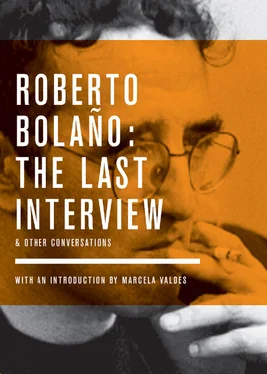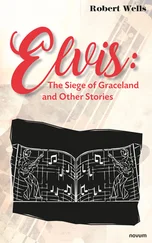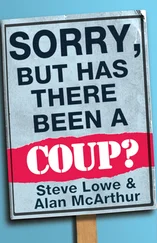HS/MB:You’re not an apologist for the project or rhapsodic about it, but you’re not a gravedigger, or a critic.
RB:I’m a survivor. I feel enormous affection toward this project, notwithstanding its excesses, immoderations and deviations. The project is hopelessly romantic, essentially revolutionary, and it has seen the failure of many groups and generations of artists. Though, even now, our conception of art in the West is indebted to this vision.
HS/MB:If there is a concept that has been devalued in this era, it is that of revolution.
RB:The truth for me — and I want to be very sincere — is that the idea of revolution had already been devalued by the time I was twenty years old. At that age, I was a Trotskyite and what I saw in the Soviet Union was a counterrevolution. I never felt I had the support of the movement of history. To the contrary, I felt quite crushed. I think that’s noticeable in the characters in The Savage Detectives .
HS/MB:At some point in your life, we imagined that you were animated by great revolutionary ardor.
RB:You imagined it correctly. I was against everything. Against New York and Moscow, against London and Havana, against Paris and Beijing. I even felt scared by the solitude entailed in radicalism.
HS/MB:Does your sense of having survived come from that?
RB:No, I feel like a survivor in a more literal sense. I am not dead. I say it like that because many of my friends have died, from armed revolutionary struggle, drug overdose, or AIDS. Although some who survived are now illustrious and famous celebrities of Spanish letters.
HS/MB:Writers are always asked for their inspiration and today will not be an exception. Some are inspired more from life, while others more from literature.
RB:In what concerns me, both.
HS/MB:Notwithstanding that, you are an extremely literary writer — to put it one way.
A:Well, if I had to choose one of the two things, and God pray that I never have to choose, I would choose literature. If I were offered a great library or an Inter-Rail ticket to Vladivostok, I would keep the library, without the slightest doubt. Besides, with the library, my trip would be much longer.
HS/MB:Like Borges, you have lived through your reading.
RB:In one way or another, we’re all anchored to the book. A library is a metaphor for human beings or what’s best about human beings, the same way a concentration camp can be a metaphor for what is worst about them. A library is total generosity.
HS/MB:Nevertheless, literature is not purely a sanctuary for good sentiment. It is also a refuge for hatefulness and resentment.
RB:I accept that. But it’s indisputable that there are good sentiments in it. I think Borges said that a good writer is normally a good person. It must have been Borges because he said practically everything. Good writers who are bad people are the exception. I can think only of one.
HS/MB:Who?
RB:Louis-Ferdinand Céline, a great writer and son of a bitch. Just an abject human being. It’s incredible that the coldest moments of his abjection are covered under an aura of nobility, which is only attributable to the power of words.
HS/MB:Between Latin American and Spanish writers, where is your literary brotherhood?
RB:Basically among the Latin Americans — but also among the Spaniards. I don’t believe in the separation of Latin American and Spanish writers. We all inhabit the same language. At least I think I cross those frontiers. And in my generation there is a mixed nucleus of writers, Spaniards and Latin Americans, the same way they were mixed in another era of Modernism, possibly the most revolutionary movement in Spanish literature of this century. Because of his strength, I think someone like Javier Maríasis forced to influence Latin American literature, and he does. He is a great writer. By the same token, young Spanish writers should be influenced by someone like Rodrigo Rey Rosaor Juan Villoro, two enormous writers. I am extraordinarily blessed by a photograph of all of us together, from this and that side of the Atlantic: Rey Rosa, Villoro, Marías, Vila-Matas, Belén Gopegui, Victoria de Stefano.
Spanish novelist, critic, and columnist Javier Marías (b. 1951) is one of the most respected contemporary Spanish writers in the world. Eleven of his books have been translated into English, including the acclaimed “Your Face Tomorrow” series.
Rodrigo Rey Rosa (b. 1958) is a Guatemalan short story writer and novelist. Paul Bowles translated many of Rey Rosa’s works into English.
A Mexican writer and journalist, Juan Villoro (b. 1956) was highly praised by Bolaño. In a television interview Bolaño claimed Villoro’s work was “opening up the path of the new Spanish novel of the millennium.” Currently no full English translations are available, but excerpts from El Testigo (2004) have appeared in various journals including The Quarterly Conversation and Common Knowledge . His short story “Among Friends” was published in the journal n+1 (Issue 8).
A Spanish novelist and friend of Bolaño’s, Enrique Vila-Matas (b. 1948) is a force in contemporary Spanish literature. He is the author of over twenty-five works. His novels have just begun to be translated to English, including Bartleby & Co . and Montano’s Malady .
Spanish novelist and screenwriter, Belén Gopegui (b. 1940) has won many Spanish language literary awards for her fiction. An English translation of The Scale of Maps will be available in 2010.
Born in Italy, Victoria de Stefano (b. 1940) moved to Venezuela in 1946. She has authored a number of novels and essay collections. Her work is not currently available in English.
Writer of the Spanish Golden Age, Francisco de Quevedo (1580–1645) was a prominent poet and politician. Much of his work is concerned with wordplay and metaphor.
HS/MB:Is it disturbing to think we have read many of our gods (James, Stendhal, Proust) in translation, in second-hand versions? Is that literature? If we spin the matter around, it’s possible we might end up concluding that words don’t have an equivalent.
RB:I think they do. Furthermore, literature is not made from words alone. Borges says that there are untranslatable writers. I think he uses Quevedoas an example. We could add García Lorca and others. Notwithstanding that, a work like Don Quijote can resist even the worst translator. As a matter of fact, it can resist mutilation, the loss of numerous pages and even a shit storm. Thus, with everything against it — bad translation, incomplete and ruined — any version of Quijote would still have very much to say to a Chinese or an African reader. And that is literature. We may lose a lot along the way. Without a doubt. But perhaps that was its destiny. Come what may.
II. “READING IS ALWAYS MORE IMPORTANT THAN WRITING”. INTERVIEW BY CARMEN BOULLOSA, TRANSLATED BY MARGARET CARSON
FIRST PUBLISHED IN BOMB, BROOKLYN, WINTER 2002
Roberto Bolaño belongs to the most select group of Latin American novelists. Chile of the coup d’état, Mexico City in the 1970s, and the reckless youth of poets are some of his frequent subjects, but he also takes up other themes: César Vallejo’s deathbed, the hardships endured by unknown authors, life at the periphery. Born in Chile in 1953, he spent his teenage years in Mexico and moved to Spain at the end of the Seventies. As a poet, he founded the Infrarealist movement with Mario Santiago. In 1999 he won the Rómulo Gallegos Prize, previously awarded to Gabriel García Márquez and Mario Vargas Llosa, for his novel The Savage Detectives , for which he also received the prestigious Herralde Prize.
Читать дальше












